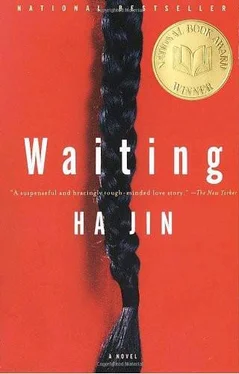Gradually their topic shifted to the marriage. How could she survive by herself if Lin Kong divorced her? What a heartless man he was. Shouldn't the Political Department protect the poor woman by ending the relationship between Lin Kong and Manna Wu? This was a new society, in which nobody should found his happiness on another person's suffering. Besides, a married man ought to be duty-bound and must not be allowed to do whatever he wanted, or else families would break up and society would be in chaos.
By the next day Shuyu's answer — "I won't do that" — had become a catchphrase among the hospital's staff. When turning someone down, young nurses would utter that sentence jokingly, stressing every word and giving a long lilt to the final "that." Laughter would follow.
Under cover of darkness, a few curious young officers even went to the long dormitory house in which Lin had been assigned a room recently. They stayed outside at the window and the door, eager to find out whether the couple slept in the same bed. They stuck their ears to the keyhole and to the window screen, but the room was as quiet as if it were uninhabited. Three nights in a row they heard nothing except for a cough made by Lin. One of the men sprained his ankle on the granite doorsteps, having trodden on a sleeping toad; another had his eye whipped by a twig in front of the house. So they gave up and admitted the couple had done nothing unusual.
Word spread — "They don't do that."
Lin and Shuyu were sitting at the dining table, on which was a white enamel plate containing a melon, cut in half and with its seeds removed. They were having a talk because their court appearance was scheduled for the next morning. The room looked brighter after all the propaganda posters left by the former residents had been removed from the whitewashed walls. The buzzing of the fluorescent lights again drew Shuyu's attention. She raised her head to see whether a mosquito was in the air. Outside, in the cypress bushes below the window, an oriole was warbling now and then. The fragrance of early chrysanthemums wafted up from the roadside, where the long flowerbed was mulched with pulverized horse dung.
"Shuyu, have you ever thought about what Hua should do in the future?" Lin asked.
"No. I guess she can work at Bensheng's store. He's good to her and pays her well. He bought her a hooded overcoat last winter. "
"No, no, she shouldn't remain in the countryside. I want to get her a job here. She's our only child and should live close to us in the city, don't you think?"
She made no answer.
He went on, "Tomorrow when the judge asks what you want from me, say you want me to find a good job for Hua, all right?"
"Why you want me to do that? I never wanted anything from you."
"Look, I've been in the service for over twenty years. According to the rule, the army should take care of our child. Trust me, they'll find her a job. This is her only chance. Please tell the judge you want that, all right?"
"Okay, I'll do that."
He took a bite of the melon in his hand. "Try this. It's very sweet," he said, pointing at the other half.
She didn't touch it, saving it for him.
Early the next morning, Lin went to fetch breakfast for Shuyu and himself. Hundreds of people were eating in the mess hall. From inside the kitchen came the brisk clank of a shovel stir-frying something in a cauldron. The air smelled of sauteed scallions and celery. Manna turned up with a lunch tin in her hand. Coming up to Lin, she tried to smile, but the effort distorted her face, two wrinkles bracketing her nose and mouth. Her eyes were shining, glancing left and right; apparently she was uneasy about meeting him in this place. He noticed a flicker of resentment pass over her face, probably because he had not seen her for several days.
She said to him, "Don't talk too much in court, all right? And don't argue with the judge." She bit her lower lip.
"I know. There's no need to worry. I talked to Shuyu yesterday evening. She agreed to stick to her word this time. It's final."
"I hope so," she muttered. "Good luck."
She walked away, not daring to talk with him longer than necessary in the presence of so many people, some of whom had already begun darting glances in their direction. Since Shuyu's arrival, Manna had kept a low profile. She avoided meeting others, not going anywhere unless she had to, and wouldn't even eat lunch in the mess hall. As a result she looked anemic.
Lin brought back to the dormitory four steamed buns, half a pot of rice porridge, and a tiny cake of fermented bean curd. For the first time since she had come, he and his wife ate together.
While eating he had a strange realization. These days he had seldom met Manna, as though she were gone on vacation somewhere. He had stopped walking with her in the evening for fear that people would gossip about them and exert pressure on the leaders to stop the divorce. Somehow this temporary separation from Manna didn't bother him at all, just as sleeping in the same room with Shuyu did not discomfort him either. To tell the truth, he didn't miss Manna, though he felt sorry for her. Is this what love is like? he asked himself. No wonder people say marriage is the death of love. The closer we are to getting married, the less attached I feel to her. Does this mean I don't love her anymore? Don't be a fool. She and I have waited for each other so many years. Now it's time to be united. Yes, true lovers don't have to stay together looking at each other all the time; they look and move in the same direction. Who said that? It must have been a foreign monk. How about Manna, what does she think of my staying with Shuyu in this room? Is she irritated by it? She must be. Does she miss me?
His mind turned to the divorce, which became almost an inevitable thing to him now. He didn't need to make any effort to bring it about, as though the whole matter was like a ripe fruit that would fall after being touched by frost. He felt as if there was some force beyond his control, of which he merely served as a vehicle, that would realize the divorce and start him on a new life. Perhaps this force was what people called fate.
As soon as Shuyu had done the dishes, a Beijing jeep pulled up in front of the house. She put on the yellow taffeta shirt Lin had bought her a week before. The couple got into the jeep, which drove them to the courthouse next to the city Police Station. Together with them, in the front seat, was Ming Chen, representing the hospital. He was the director of the Political Department now; he had grown stout with thick shoulders and a fleshy face.
It was half past eight. The poplar-lined street was speckled with people bicycling to work or returning home from their midnight shifts. The concrete buildings, their red tiles covered with dew, were steaming and glistening in the sun. As the jeep was passing an elementary school, groups of boys were playing soccer on the sports ground, shouting and chasing five or six balls. Girls were skipping ropes or kicking shuttlecocks. Obviously the pupils were at their first recess. At the corner of Peace Avenue and Glory Street a walking tractor was lying on its side, knocked over by an East Wind truck. Zucchini were strewn on the ground; a crowd gathered there watching and chatting; the truck was left on the sidewalk, its fender bent against a thick tree trunk. Several old women were pushing carts, each of which was loaded with a sky-blue box; they were shouting, "Milk and chocolate popsicles, ten fen apiece." A siren was screaming a few blocks away, growing louder and louder. The jeep carrying Lin and Shuyu nosed through the crowd and then turned left into West Gate Road to the Police Station.
At the entrance to the courthouse, which was a chapel built by Danish missionaries in the 1910s, Lin saw a young couple coming out. The husband looked sullen, while the wife sobbed into a white neckerchief and was supported by an older man, apparently her father. A guard told Director Chen that the judge had just turned down the woman's plea for a divorce. She had accused her husband of physical abuse and stealing her money. The judge had not agreed with the latter part of the accusation. As a married couple, they lived under the same roof, slept in the same bed, and ate from the same pot; of course they should share a bank account. By no means should the husband be charged with theft.
Читать дальше











